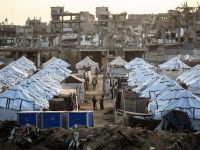Iranian President Mohammad Khatami looks to be headed for a second term in the country’s June 8 presidential contest, despite an attack on his campaign headquarters and rocky terrain presented by a conservative judicial branch.
"What we want is reform in all areas -- political, economic and social," Khatami last month told a crowd of 30,000 at the only scheduled rally of his campaign. "The road is long and there are many obstacles in our way.”
Among those obstacles are ongoing threats to his campaign workers, according to Iran’s official news agency (IRNA), as well as a late May incident that saw Khatami’s main Tehran campaign headquarters set ablaze by motorbike-riding attackers.
Meanwhile, the centrist daily Entekhab last month reported that many of Khatami’s supporters had this year been jailed and their newspapers closed down by the conservative-controlled courts.
There has been long-running tension between the courts and Khatami, the fifth president of the Islamic Republic of Iran, who will face nine opponents on June 8.
The authorities have effectively closed down the main opposition party, the Iran Freedom Movement, in the run-up to the polls.
The latest blow to reformists, two months before the scheduled election, was the arrest of 42 active members of the liberal opposition on charges of trying to overthrow the Islamic regime.
"When I see measures against the press and arrests of individual members of political groups I can only express my regret," Khatami told newspapers in the wake of the arrests.
In spite of these obstacles, Khatami, who won the 1997 contest with almost 70 percent of the vote, counts in his column the support of many legislators and Muslim clerics.
IRNA reported last month that about 4,600 Iranian clerics had issued a letter calling on Khatami to run for a second term, describing him the rightful and ideologically-true issue of the founder of the Islamic Republic, Imam Khomeini,
"During your tenure as president, we have witnessed that youths have forged relations with theological schools and have been in close contact with clerics," the letter said.
In addition, an overwhelming majority of more than 220 legislators sent a similar letter of support to the president, asking him to run.
Moreover, according to a government-run daily, a straw poll conducted before the president announced his candidacy found that "83.3 percent of Iranians…will certainly vote for Khatami if he seeks a second term in office."
The poll, conducted by a “national institute,” said that 58.4 percent of Iranians felt Khatami's re-election would rehabilitate the administration of the country, while only 15 percent warned that things would get worse if the president sought a second term.
CROWDED FIELD
Khatami actually sparked widespread speculation that he might decline the chance at a second term by delaying the registration of his candidacy until the last minute. Critics accused him of keeping the country on tenterhooks in order to win more votes.
After he filed to run, Khatami’s bid had to be approved by Iran's Guardian Council, which is responsible for vetting all aspiring candidates.
Ten candidates, including Khatami, were given permission to run. The other nine to receive the green light were Defense Minister Rear Admiral Ali Shamkhani, former information minister Ali Fallahian, former labor minister Ahmad Tavakoli, former energy minister Hassan Ghafouri-Fard, head of the Physical Education Organization Mostafa Hashemi-Taba, chancellor of the Open University Abdullah Jasbi, university lecturer Mahmoud Kashani, former vice president Mansour Razavi, and former MP Shahabuddin Sadr.
REVOLUTIONARY ROOTS
Hojjatoleslam Seyed Mohammad Khatami was born in Ardakan, in the central province of Yazd, in 1943.
Son of Ayatollah Ruhollah Khatami, Khatami finished his early schooling in his home province before attending Qom Theology School in 1961. Later, he earned a BA in philosophy from Isfahan University, and completed religious studies at a senior level at Qom Seminary.
In 1970, Khatami entered the Univerity of Tehran and graduated with an MA, after which he returned to Qom to work on his philosophical studies at the seminary.
He later became involved in political activities and the campaign to depose the US-backed Shah, beginning his political activities for the Association of Muslim Students of Isfahan University. Khatami reportedly worked closely with the Ayatollah Khomeini's late son, Hojjatoleslam Ahmad Khomeini, as well as Mohammad Montazeri.
After the revolution in 1979, he replaced Ayatollah Dr. Beheshti as head of the Hamburg Islamic Center in Germany.
Khatami represented the Ardakan and Meibod constituencies in the first term of the Majlis [Parliament] in 1980. He was also appointed head of the Kayhan newspaper institute by the late Ayatollah Khomeini in 1981, a post from which he later resigned.
In 1982, he was appointed as the minister of culture and Islamic guidance during the premiership of Mirhossein Mousavi. During the 1980-1988 war with Iraq, Khatami had different responsibilities including deputy and head of the Joint Command of the Armed Forces and chairman of the War Propaganda Headquarters.
He was once again appointed as the minister of culture and Islamic guidance by President Hashemi Rafsanjani in 1989. Following his resignation in 1992, Khatami was appointed as cultural advisor to President Rafsanjani and head of Iran's National Library. In 1996, he was appointed as a member of High Council for Cultural Revolution. As president, he is the head of the council.
The president, who speaks several foreign languages including English and German, is the father of two daughters and a son.
CHALLENGES AHEAD
Should Khatami win a second term, he faces both the internal challenge of the conservative courts, and the external problem posed by a cold war with the US.
In terms of foreign relations, US lawmakers are working to extend unilateral economic sanctions against Iran and Libya by another five years. The American-Israel Public Affairs Committee, a leading pro-Israel lobbying organization, has waged an intensive campaign to ensure that the legislation, known formally as the Iran-Libya Sanctions Act (ILSA), will be extended when it runs out in August.
ILSA was enacted in 1996 to discourage foreign energy firms, including those in Europe, from investing in Iran and Libya. The justification is Iran’s alleged role as a state sponsor of terrorism.
The legislation gives the US president the authority to bar or reduce imports of goods from countries that invest in Iran and Libya.
Congressional aides have predicted that the House of Representatives will begin acting on the legislation soon after Congress returns from recess on June 6, said the agency.
Some administration officials have discussed with Congress the possibility of giving Bush maximum flexibility under the law to waive sanctions if he deems it in the US interest.
From the Iranian side, there are signs that even certain influential Iranian clerics want to open a new era of relations with the US, which means rebuilding ties that have been severed since 1979, when Islamic militants stormed the US embassy in Tehran and took 52 diplomats hostage for 444 days.
According to Reuters, one key cleric, reported to be close to Supreme Leader Ayatollah Ali Khamenei, has called for discreet talks to pave the way for relations with the United States.
Hojatoleslam Taha Hashemi said he believed Tehran could open ties with Washington during a second term by Khatami.
"If the United States shows its goodwill, there is no rational opposition to these relations," Hashemi told Reuters in an interview.
Meanwhile, several conservative presidential candidates have talked in general terms about better relations with the West during the campaign.
But according to Reuters, Khatami, who was blasted by hardliners for a 1997 CNN interview in which he called for a "breach in the wall of mistrust" between the two countries, has avoided the issue.
Asked whether he saw any prospect of opening relations with the United States after the election, the head of Khatami's office, Mohammad Ali Abtahi, told Reuters: "You won't see any new perspective in this regard."
Nor is it clear what will come of the ongoing tensions between Khatami and the conservative clergy and court system.
At least in his campaign rhetoric, Khatami sounds confident that past reforms will lead to future victories.
"The votes you cast four years ago for the reform program have made a drastic change in the mentality of the Iranian community,” he told the crowd at his May rally. “The demands put forward by the reform movement were regarded…as anti-religious and counterrevolutionary.
"Today, everyone is free to express desire for freedom, civil society, social justice and the fundamental rights of the people. Isn't it a victory for the reform movement?" -- Albawaba
© 2001 Al Bawaba (www.albawaba.com)







